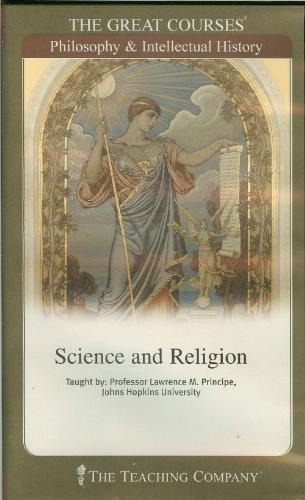A series of twelve lectures on the history of the interaction and relationship between science and religion, including the contributions of Augustine, Galileo, and Darwin, as well as recommendations for thinking intelligently about the intersection between science and religion in the twenty-first century.
All in all, this was a pretty decent series. Principe is a good lecturer, and he handles complex topics well. He has the credentials to back up his claims, too--a Ph.D. in both a hard science (organic chemistry, no less) and the history of science.
His main point is that modern folks think that science and religion are opposed to one another--the so-called 'Warfare Thesis', which he discusses at length. Principe doesn't buy this idea, though, and prefers to think of science and religion as separate spheres--that is, that religion tells us things about theology and is ill-equipped to tell us anything about the natural world, and science tells us things about the natural world but is ill-equipped to tell us things about theology.
Which sounds fine until you have the two facing off over specific issues. And anyway, the Christian view of the Bible does not limit its authority to 'theological' matters. For example, the Chicago Statement on Biblical Inerrancy states that the Bible "is of infallible divine authority in all matters upon which it touches" and "is without error or fault in all its teaching, no less in what it states about God's acts in creation, about the events of world history, and about its own literary origins under God, than in its witness to God's saving grace in individual lives." An orthodox view of scripture thus does not cede authority over the natural world to science. And there are many points where the two disciplines are directly opposed, and each claims the authority to speak decisively. For example, the literal interpretation of Genesis 1-2 is that God created the heavens and the earth out of nothing in six days, that man was made from dust on the sixth day, and that the earth is less than 10,000 years old. These are statements that modern science flatly denies--it is argued, rather, that man and other animals evolved over millions of years from a common ancestor and the earth is itself billions of years old. Even if science restricts itself from making claims about God's involvement in this process, the two are in conflict.
Of course, some theologians--and some scientists--try to split the difference by interpreting the bible differently or allowing for divinely directed evolution. But at the end of the day, there will eventually be conflict somewhere, and one or the other must be supreme--will we alter our interpretation of scripture to fit science or will be adjust our scientific conclusions based on the bible? All of which to say, I think Principe's argument is a bit simplistic. Actual conflicts are inevitable and must be acknowledged.
Then, too, I took issue with some of Principe's less than unbiased language (the label of 'naive' literalism doesn't leave much room for objectively examining the merits of this style of interpretation).
Ultimately, it was interesting to learn more about the way science and religion related to one another throughout history, and it's certainly helpful to know they weren't always viewed as being in conflict. But I suspect Principe was touting his own belief system more than anything, and another lecturer with a different set of beliefs would have reached completely different conclusions. Which is, I suppose, to be expected.
Which sounds fine until you have the two facing off over specific issues. And anyway, the Christian view of the Bible does not limit its authority to 'theological' matters. For example, the Chicago Statement on Biblical Inerrancy states that the Bible "is of infallible divine authority in all matters upon which it touches" and "is without error or fault in all its teaching, no less in what it states about God's acts in creation, about the events of world history, and about its own literary origins under God, than in its witness to God's saving grace in individual lives." An orthodox view of scripture thus does not cede authority over the natural world to science. And there are many points where the two disciplines are directly opposed, and each claims the authority to speak decisively. For example, the literal interpretation of Genesis 1-2 is that God created the heavens and the earth out of nothing in six days, that man was made from dust on the sixth day, and that the earth is less than 10,000 years old. These are statements that modern science flatly denies--it is argued, rather, that man and other animals evolved over millions of years from a common ancestor and the earth is itself billions of years old. Even if science restricts itself from making claims about God's involvement in this process, the two are in conflict.
Of course, some theologians--and some scientists--try to split the difference by interpreting the bible differently or allowing for divinely directed evolution. But at the end of the day, there will eventually be conflict somewhere, and one or the other must be supreme--will we alter our interpretation of scripture to fit science or will be adjust our scientific conclusions based on the bible? All of which to say, I think Principe's argument is a bit simplistic. Actual conflicts are inevitable and must be acknowledged.
Then, too, I took issue with some of Principe's less than unbiased language (the label of 'naive' literalism doesn't leave much room for objectively examining the merits of this style of interpretation).
Ultimately, it was interesting to learn more about the way science and religion related to one another throughout history, and it's certainly helpful to know they weren't always viewed as being in conflict. But I suspect Principe was touting his own belief system more than anything, and another lecturer with a different set of beliefs would have reached completely different conclusions. Which is, I suppose, to be expected.

No comments:
Post a Comment